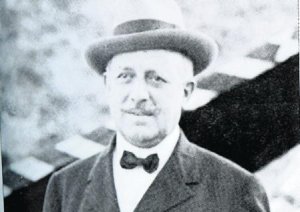
Before embarking on an article about Oliver van der Zee’s recent documentary El último magnate, an important question to ask is why this film about the little-known yet groundbreaking Spanish mogul Horacio Echevarrieta has been all but overlooked in his home turf of the Basque Country (not to mention much of the rest of Spain).
Perhaps one clue is director José Antonio Hergueta’s comment to El País that Echevarrieta “was the man of the moment in Spain, the most famous, the richest; a pioneer and innovator…(but) these days no-one even in the Basque Country remembers who he was.”
All attempts to watch this 80-minute documentary (known internationally as The Last Tycoon and part financed by Basque media company Euskal Telebista ) in San Sebastián were ultimately abortive. The week it opened (February 24) it was showing in just one cinema in the whole city during a single late-night session. By the following Friday, it had already been removed. I began to doubt its very existence – not to mention my sanity – when I couldn’t even find it on a search index that threw up everything from El último cazador to El último tango en Paris.
Admittedly, documentaries generally have a limited shelf-life in cinemas. Of course, another possible clue for this film’s brief passing through popular movie theatres could be the potentially controversial story of its subject matter, Horacio Echevarrieta.
A key influential figure in the development of engineering and industry in the north of Spain in the opening decades of the 20th century – particularly in and around the city of his birth, Bilbao, an area which to this day enjoys considerable affluence – Echevarrieta built up a network of business interests after inheriting his father’s fortune.
As well as iron mining, cargo ships and newspapers, he was a founding member of major companies such as Iberdrola and Iberia, and had a hand in the construction of Madrid’s Gran Vía and Barcelona’s underground system.
So far, all good reasons for Echevarrieta to be hailed as a genuine hero. His vision saw his involvement in the development of some of the most up-to-date technology of the era that would transform 20th-century Europe. But not for nothing has he been dubbed the Basque version of William Randolph Hearst. Joining forces with eventual Nazi Wilhelm Canaris during the 1920s, the two men formed a network of business deals and espionage which led to the construction of the E-1 submarine.
I wish I could say more at this point about the documentary’s treatment of this potentially fascinating figure.
It is a shame I can’t, because, like Hearst or Howard Hughes – another tycoon to whom he is often compared – Horacio sounds like a complex fellow: brilliant yet misguided. He was eventually gaoled for his collaboration with Canaris (who was hanged for his part in the 1944 Valkyrie plot to assassinate Hitler) to help rearm Germany by enabling them to bypass the Treaty of Versailles, which forbid the country from building such extensive arms on their territory.
Later, the Franco era would see Echevarrieta stripped of much of his wealth and business interests (including Iberia, which was nationalised) and this giant force of a man fell into oblivion.
Unfortunately for him and his chroniclers, this documentary aimed at recovering his memory looks set to do the same.
Leave a Reply
You must be logged in to post a comment.